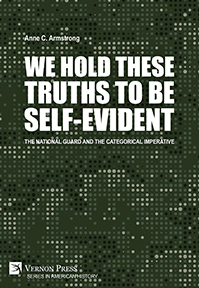
The following is an excerpt from the opening abstract of the book, “We Hold These Truths to Be Self-Evident: The National Guard and the Categorical Imperative,” which dives into the historical and philosophical roots of the National Guard of the United States. Designed to be an academic study, the book is authored by Anne C. Armstrong, an alumnus of the Doctor of Liberal Studies program at Georgetown SCS.

This book makes the ethical case for a volunteer Citizen-Soldier military in a democratic republic using Immanuel Kant’s (1724-1804) Categorical Imperative as justification. An Enlightenment theory, Kant’s Categorical Imperative represents a higher moral duty free from reliance upon consequence. The Categorical Imperative directs that a moral law fit three requirements: the action must be universally applicable, deemed as fair by all parties to the action, and not use men as a means to an end. By reviewing the history of the National Guard of the United States, I draw the reader away from a traditional Utilitarian argument of cost/benefit analysis and demonstrate that the Deontological argument is equally applicable. National Guard history is relevant because the Citizen-Soldier military in the United States has evolved over 400 years. Beginning with the first legislated Muster in 1636, pre-Enlightenment village bands protected the tiny, immigrant communities, today volunteer Citizen-Soldiers stand shoulder-to-shoulder with their career counterparts in both domestic and foreign theaters. While the Utilitarian based cost/benefit analysis changes over time with circumstances, I demonstrate that the Categorical Imperative applies throughout the National Guard’s long, complicated history.
The procedure used to make the argument follows the history of the United States in chronological order. In each chapter, a significant leader is looked at closely – how that person reflected the Categorical Imperative over the changes in the National Guard from the First Muster in 1636 to present day. Specifically, we look at the birth of the nation with General George Washington, the turbulent nineteenth century to World War One with Senator Charles Dick (R-OH), and the post-modern era of the 1940s through the early twenty-first century with Generals Ellard A. Walsh and Frank Grass. By evaluating world events and these remarkably influential men, we observe the Categorical Imperative in action as it shapes the National Guard and reflects the Enlightenment principles upon with the nation was founded. In conclusion, the reader will see that Kant’s theory of a higher moral duty – one that results in a universal law of fairness and non-manipulation of one’s fellow man as a means to an end – does, in fact, readily apply to the Citizen-Soldier concept in a democratic republic such as the United States.

